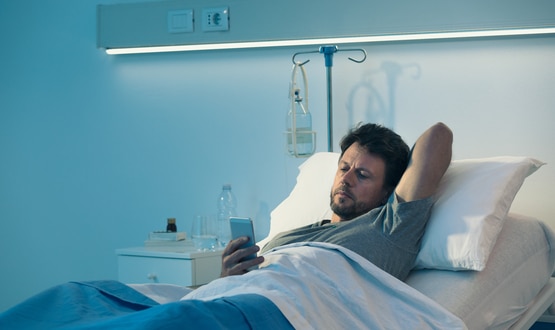MedShr social media-style platform launches online trauma meeting
- 28 January 2019

A social media-style platform for clinicians and healthcare professionals to discuss cases and medical images has launched a new group where they can post X-rays, MRI and CT scans.
MedShr, which has 850,000 members in more than 190 countries, developed Trauma Meeting to allow clinicians to discuss cases with colleagues around the globe.
The app enables doctors and surgeons to draw on the knowledge of their peers without having to leave the hospital they work in.
Dr Asif Qasim, founder and chief executive of MedShr, said: “Every morning in a hospital there will be a trauma meeting where the orthopaedic surgeons and sometimes emergency medicine doctors look at the patients that came in the day before with trauma.
“The trauma meeting is an integral part of case discussion and planning within orthopaedics and, essentially, we are recreating each of those local meetings into a global trauma meeting.”
Dr Qasim, who is also a consultant cardiologist in London, launched MedShr to enable clinicians to share cases and clinical images without a risk to patient safety.
The app also provides a level of peer-to-peer learning, especially for doctors in developing countries that don’t always have access to specialist training conferences and meetings.
It also provides medical students and doctors in training the opportunity to connect online with senior specialists.
MedShr has a variety of other platforms alongside Trauma Meeting including; Tumour Board, which allows clinicians to discuss tumour cases; and General Surgery.
“This kind of case discussion should happen on a bespoke platform that protects patient privacy and not happen on open social media,” Dr Qasim added.
“We know that using Twitter, LinkedIn, Facebook, Instagram to do these kinds of things is useful, but it’s not appropriate.
“We have powerful devices that we carry around with us and we use them for so many things to make life easier and yet there’s a risk we practice medicine in a rather old-fashioned way.”
Giving clinicians the ability to communicate more is an issue which a number of technology companies are trying to tackle.
For example, in August 2018, Digital Health News reported on how System C’s CareFlow Connect app was rolled out to clinicians at University Hospitals Bristol NHS Foundation Trust to help link up care teams and reduce the organisation’s reliance on paper.





3 Comments
The suggestion that these platforms “protect patient privacy” is ludicrous A patient might reasonably be asked for their consent to being exhibited to an audience in a hospital where they are being treated. Being exhibited around the globe is something else altogether. Does the patient get any say in this? Of course not; they won’t even know it is happening. Technology is once again being used to enable secrecy and deception. Physicians should know better than to condone this. I will never trust one who does.
Hi Bertl, we developed MedShr to allow doctors to learn from one another and have always protected patient privacy and confidentiality. MedShr has a built in consent feature for patients, and clinical cases are shared only within MedShr. All members are verified and we are proud of the impact that our members have had in improving patient care around the world
I think you are missing the point. While I concede that it is something that patient consent is obtained (if in fact it is obtained) I personally, and probably many patients, actually dislike being treated as an exhibit, for the purpose of medical education. We recognise that medical education is necessary and important so we probably consent, if asked, but very often we are not even asked. My point, above, is that patients are being put under pressure to allow this practice and what your wretched technology is doing is to greatly increase the potential audience to which patients will be exhibited. This is well beyond what is reasonable.
It is completely irrelevant that this is an exclusive club. I do not want my physicians to be members of this club or to use me in this way. With respect, I find the self congratulation of MedShr highly offensive. I do not think that the much vaunted marriage between healthcare and tech companies is improving healthcare. The interests being served are the interests of tech companies and their shareholders, not those of NHS patients. These decisions are made on commercial rather than medical grounds. If this technology is adopted by the NHS, the next thing they will be selling in the global market is medical education (using NHS patients as learning aids). Once again patients are being used as fodder for growth of the biotechnical economy. I might have a responsibility as a patient to allow my doctors to use me to educate their students, as uncomfortable as I am with this. I do not have an obligation to be used in this way to promote economic growth as per the Government’s declared industrial strategy.
Comments are closed.